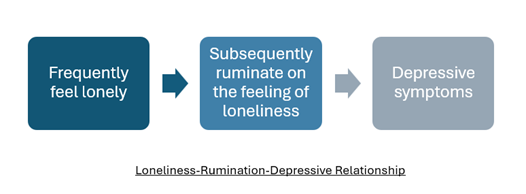Media
HKU study shows ruminating about being lonely is more closely linked to depression than actual loneliness
15 Jan 2025
Loneliness is more likely to cause depression if one keeps ruminating on how lonely they are. This is the essence of a study by The University of Hong Kong (HKU) that has therapeutic implications for treating isolated individuals or populations.
Past studies have identified a loneliness-rumination-depression nexus. Rumination is defined as repetitive and intrusive negative thoughts and feelings, and loneliness as a gap between desired and actual social connections.
Given a widely reported high co-occurrence between loneliness and depression, a research team led by the Director of the State Key Laboratory of Brain and Cognitive Sciences, Professor Tatia M.C. Lee, Chair Professor of Psychological Science and Clinical Psychology and May Professor in Neuropsychology at HKU, sought to understand the underlying mechanisms.
The research team’s hypothesis for their study, entitled “A network analysis of rumination on loneliness and the relationship with depression”, which was recently published in Nature Mental Health, aimed to examine the connections that rumination would mediate the relationship between loneliness and depression, where a higher level of loneliness would be associated with more rumination, which would, in turn, link to a higher severity of depressive symptoms.
“Our study examined the relationship between loneliness, rumination, and depressive symptoms using the network analysis methodology. The findings revealed that ruminating on the feeling of loneliness poses a significant risk of developing depression. Consequently, focusing interventions for loneliness could potentially be a pivotal strategy for curbing the escalating incidence of depression.” Professor Lee says.
The research team studied 900 adults in Hong Kong, Guangzhou, and Fuzhou, China, between 2021 and 2023 during the outbreak of the Covid-19 pandemic. Strict COVID-19 lockdowns in Hong Kong and China provided the cohort of individuals to study. The team used a network analysis approach to construct the Loneliness-Depression and Loneliness-Rumination-Depression network using a cross-sectional design in the adult sample. Network analysis focuses on how individual items connect within and across the larger variable and how these connections influence the behavior of the network to explain larger phenomenon.
The findings indicated that ruminating on the feeling of loneliness was the key underlying factor that modulated the loneliness-depression relationship. Specifically, a connection between a specific ruminative thought (“think about how alone you are”) and a particular item of loneliness (“how often do you feel alone”) is indeed essential in maintaining the loneliness-rumination-depression network.''
Based on the findings, the research team suggests interventions for depression should focus on ameliorating ruminative thoughts, especially the feeling of loneliness. Therapies should target at disrupting the link between frequently feeling lonely and ruminating on loneliness, which then would deactivate the network of loneliness, rumination, and depression; thereby minimizing the adverse effects of loneliness on causing depression.
This study was recently published in Nature Mental Health, in an article entitled “A network analysis of rumination on loneliness and the relationship with depression”. (Link to the paper: https://www.nature.com/articles/s44220-024-00350-x)
Media enquiries:
Miss Alice Wong, State Key Laboratory of Brain and Cognitive Sciences, HKU (Tel: 3917 1230; Email: sklbrain@hku.hk)

